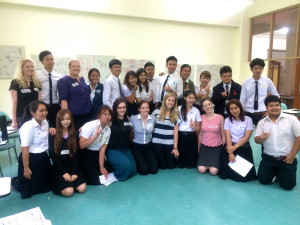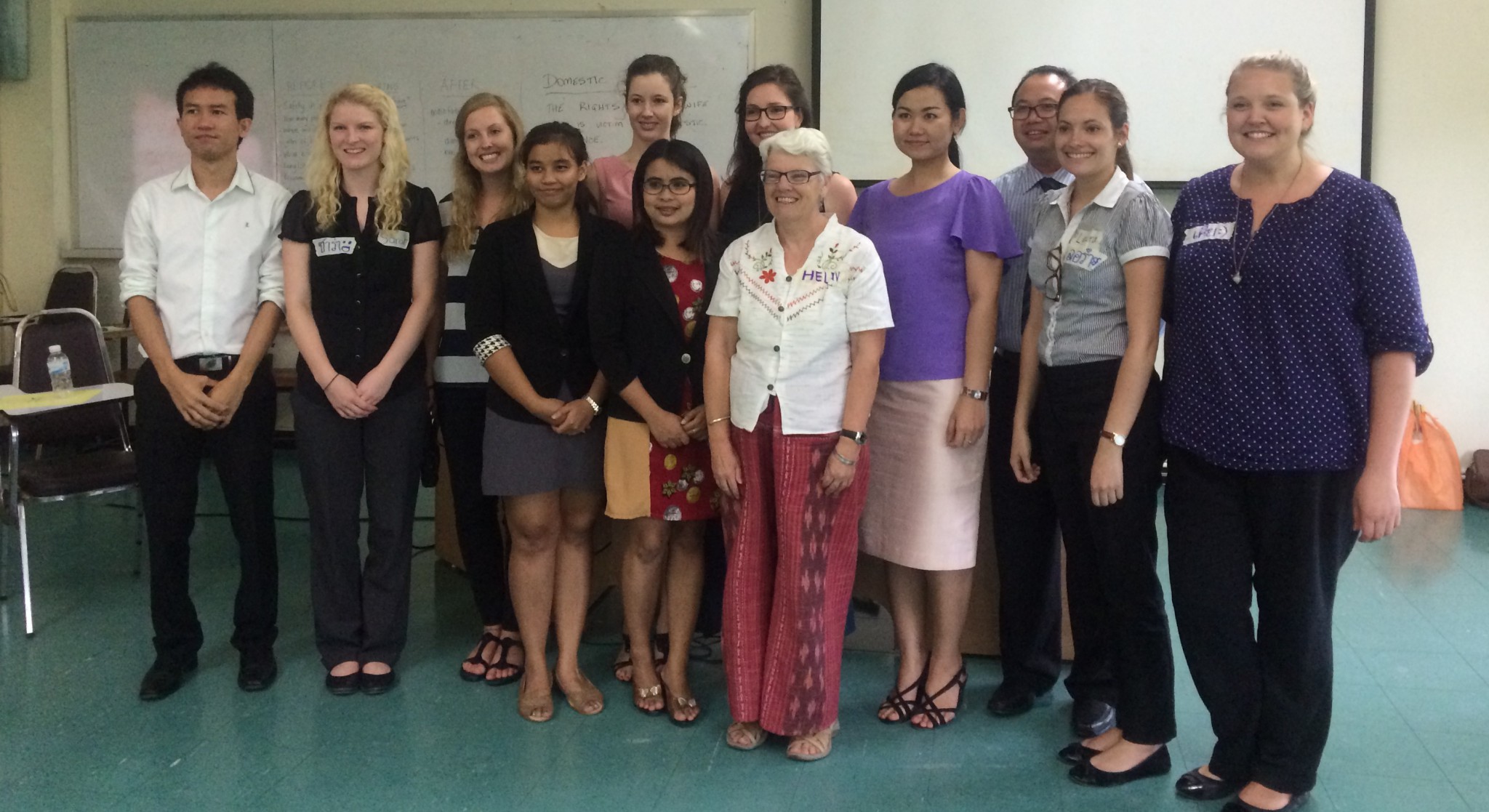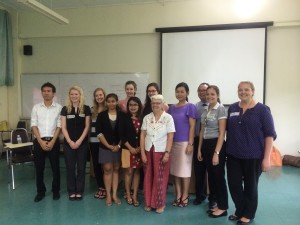By Laura Bereicua, Amanda Dixon and Kia Daley
University of Newcastle, Australia Interns, July 2014
On July 27, we packed our bags and travelled, with BABSEACLE/BABSEACLE Australia Director Helen Yandell and BABSEACLE Trainer and Events Coordinator Suphamat Phonphra (Bee), to the Khon Kaen University campus, in Nong Khai and embarked on our first teaching experience. Over two jam-packed days, we shared knowledge, with 20 university students, about the importance of community teaching, and introduced the students to new knowledge, skills and values that they can put into practice, as they move forward, in their clinical legal education and future legal careers.
The day kicked off, with a welcome from the faculty and Dean, before getting the students engaged in a session, on “‘What is CLE and Why is it important?’” During this first session, it became apparent that our “‘Superwoman” translator’ (Bee) would be an essential asset, throughout the weekend, to bridge the language gap. Bee did a stellar job, over the course of the next few days, and the language barrier was overcome, with no problems whatsoever. The students really enjoyed a puppet show activity that allowed them to release their inner “‘dramatist“‘, and the group shared many a laugh, as the characters were narrated, to perform the “‘Gangnam Style“‘ – not once, but twice. Overall, the student came away with an understanding of the potential role and importance of CLE, for their community. This session also clearly established that dance and song (specifically K-Pop Singles) are a universal language, understood by all.
The next session was on “CLE: Teaching Methodologies”. We were a little apprehensive about whether or not the students would understand and enjoy learning, about CLE teaching methodologies, as it is such a new concept,and one which we had found challenging, at the beginning of our own internship. However, the activities we used, including a roleplay and a “take-a-stand” activity, appeared to really engage the students, and to help them understand the concepts behind CLE. Importantly, these activities seemed to break the ice, at an early stage, in day 1, and built a positive working environment, among the students. Given that the traditional approach to legal education largely involves the theoretical study of substantive law, we were pleased that the students were open to learning, about new pedagogical methods, and that they conceptualised these, as an integral aspect of social justice-focused community education.

A key objective, when teaching the university students, was to help them understand and appreciate the value of community legal teaching programs, which have become an object of interest to their law school. Community teaching programs enable law students, and others, to help marginalized people, become aware of their legal rights and where to obtain legal assistance. Through this process, students learn by doing, as they teach and learn from the community, at the same time. These programs serve the community, and are a legal problem resolving resource to economically and other disadvantaged people.
On Day 1, we challenged the students, by asking them to brainstorm about the kinds of groups and people who are most likely to face access-to-law issues but they demonstrated impressive creative skills, in ways that we, as teachers, had not thought of, which made it a valuable learning experience, for everyone!
On Day 2, we divided the students into groups, and asked them to participate in a role play, where they had to engage with ”community leaders”, and to prepare a community teaching (each leader had a set of secret facts that outlined the circumstances and needs of their particular community). We all had lots of fun, as everyone really engaged with their roles, and came up with many community teaching ideas. It was apparent that the students had a clear idea of the importance and value of community teaching programs, and how such programs might be put into practice.
Students were given time to prepare a community teaching lesson plan, in which they used their new knowledge, skills and values to each deliver a ten-minute portion of such lesson plan, and to demonstrate role play, visual brainstorming, group discussion and games. Various domestic violence issues were presented, and addressed, in sensitive ways. Students appeared to acknowledge and appreciate peer evaluation, as they had opportunities to constructively critique others’ plans to identify possible areas for improvement, and to suggest ways in which students’ roles can be balanced and shared.
Following the principle of “learn best by teaching”, we all increased our understanding of Community Legal Education, especially the improvement of a meaningful, long-term change in Southeast Asian legal education that will ultimately empower these communities. Although all of us were taken out of our comfort zones, this experience was a highlight of our internship, and it instilled confidence in our new knowledge, skills and values, will impact our future clinical legal education programs, has increased our understanding CLE, and has fine-tuned our ability to teach our peers and to have them, in turn, teach us about their communities, values and aspirations.


